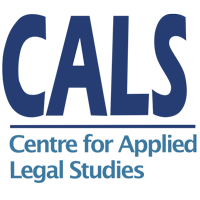CALS believes strongly that terminally ill people should have the right to choose when and how they end their lives. A lack of access to assisted dying impacts on a person's right to dignity, to equality and not to be tortured or treated in a cruel, inhuman or degrading way. This has led to our intervention in an appeal by the Minister of Justice and Correctional Services against the estate of the late Robert Stransham-Ford.
In April 2015, Mr Stransham-Ford applied to the North Gauteng High Court requesting that a medical professional be allowed to help him to end his life. At the time, he was suffering from terminal cancer and complained of intolerable, constant pain and suffering. Judge Fabricius ruled in his favour and ordered that any willing medical professional that assisted Mr Stransham-Ford to die should not face criminal charges or disciplinary action. Sadly, Mr Stransham-Ford passed away hours before and did not live to hear the landmark judgment.
The matter has since been taken on appeal to the Supreme Court of Appeal by the respondents in the matter - the Minister of Justice and Correctional Services, the Minister of Health, the National Director of Public Prosecutions and the Health Professions Council of South Africa.
In March 2016, the Centre for Applied Legal Studies (CALS) was granted leave to enter the matter as amicus curiae or ‘friend of the court’. We support the findings of Judge Fabricius and the submission of Mr Stransham-Ford’s estate that being able to die with dignity is a fundamental human right. We argue that denying a terminally ill adult of sound mind the right to end their life with the assistance of a willing doctor amounts to torture or cruel, inhuman and degrading treatment.
The suffering experienced by terminally ill patients like Mr Stransham-Ford can be torturous, with daily experiences of constant extreme pain and a vastly reduced quality of life. In addition to physical pain which may be unbearable, torture also includes mental pain and suffering. This is true for terminally ill patients where experiencing a lack of autonomy, knowing that they will not recover, expecting further deterioration and pain, and depending on others for all daily tasks can amount to severe pain and suffering. Refusing a terminally ill person the choice of assisted dying intentionally prolongs this suffering and there is no justification for this.
CALS also hopes to assist the court further by presenting evidence from three experts in end of life care from the Netherlands and the state of Oregon where assisted dying is legal. The experts (an ethicist, a hospice director, and a physician) describe the policy in place in these areas and their experience in implementing the laws on assisted dying. They are also able to speak to the evolution of medical ethics and the nature of terminal illnesses and end of life care.
On 6 December 2016, the Supreme Court of Appeal upheld the appeal. The judgment may be found below.
Resources
CALS Guide to Assisted Dying
Court Papers
Judgments
Application to adduce evidence
- Centre for Applied Legal Studies Founding Affidavit March 2016
- Supporting Affidavit by Ann Jackson March 2016
- Supporting Affidavit by Peter Reagan March 2016
- Supporting Affidavit by Suzanne van der Vathorst March 2016


